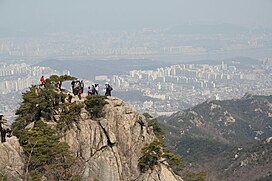Gwanaksan
| Gwanaksan | |
|---|---|
  Gwanaksan | |
| Highest point | |
| Elevation | 632 m (2,073 ft) |
| Prominence | 632 m (2,073 ft) |
| Coordinates | 37°26′44″N 126°57′49″E / 37.44556°N 126.96361°ECoordinates: 37°26′44″N 126°57′49″E / 37.44556°N 126.96361°E |
| Geography | |
| Location | South Korea |
| Parent range | Gwangju Mountains |
| Climbing | |
| Easiest route | Gwanak Station, Anyang |
| Korean name | |
| Hangul | |
|---|---|
| Hanja | |
| Revised Romanization | Gwanaksan |
| McCune–Reischauer | Kwanaksan |
Gwanaksan (Korean for Mt. Gwanak; 632 m[1]) is a mountain in southern Seoul, South Korea. Portions lie in the Gwanak-gu and Geumcheon-gu districts of Seoul; other portions lie in the neighboring cities of Anyang, Gyeonggi and Gwacheon.
The name gwanak means "hat-shaped peak," and refers to its gat-like profile. Thus Gwanaksan literally means "mountain of the hat-shaped peak." Currently it is referred to as "Gwanak," since san already contains the meaning of "mountain."[2] Together with Songaksan in Kaesong, Gamaksan in Paju, in Pocheon, and Hwaaksan in Gapyeong, Gwanaksan was long considered one of the five representative peaks of Gyeonggi-do (gyeonggi o-ak).
The main campus of Seoul National University is located just northwest of the mountain, and the Gwacheon national government complex lies to the east. Also nearby is the , a popular local tourist attraction. On the mountain itself lie numerous Buddhist temples, including Wongaksa. Most of the mountain slope is protected land. The mountain is very popular with older climbers, since it can easily be reached by Seoul's public transportation. Annual hiking traffic is close to 5 million people.[3] The Seoul side was designated a city park in 1968.
Trails[]
Seoul National University Entrance (11.3 km, 4 hours) Siheung-dong (11 km, 3 hours, 30 minutes) Anyang amusement park (12 km, 4 hours, 30 minutes)
Gallery[]
Yeonjudae - the summit
Radar equipment on the summit
Yeonju Hermitage on the Gwacheon side
References[]
- ^ Some sources give 629 m
- ^ 명칭의 유래. Gwanak-gu website (in Korean). Archived from the original on 2004-12-07. Retrieved 2006-05-28.
- ^ "Com Trends" (in Korean). Retrieved 2010-08-21.
See also[]
| Wikimedia Commons has media related to Gwanaksan. |
- Mountains of Seoul
- Mountains of Gyeonggi Province
- Gwanak District
- Geumcheon District
- Anyang, Gyeonggi
- Gwacheon
- Mountains of South Korea


